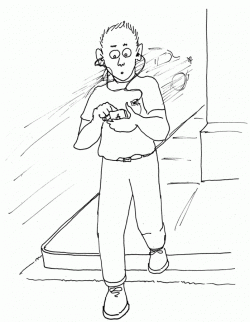Listen up! 'iPod zombies' present hazards
Q. Who's in danger of running down an iPod pedestrian?—B. Gates
A. You are if you drive, because "iPodestrians" are everywhere, oblivious to the dangers as they read and compose e-mail, or text, or read Facebook and Twitter status updates, or scan RSS feeds, or "bliss out" on their favorite tunes, says Paul McFedries in IEEE Spectrum magazine.
These iPod "zombies" join the world of iPhone zombies, BlackBerry zombies, cellphone zombies, and more, including the iPod zombie joggers, dog walkers, rollerbladers, cyclists. Similarly, at your local Starbucks are the laptop zombies tuned out to everyone and everything else around them. Cognitive scientists call this "inattentional blindness," or "the failure to detect the appearance of an unexpected, task-irrelevant object in the visual field."
On the road, the risk naturally increases if the driver is likewise zoned out texting, a form of "digital drunkenness" that gives new meaning to DWI, or "driving while intexticated." Where the driver is preoccupied via cellphone, that's DWY for "driving while yakking."
Perhaps the best solution for all of us is simply to look out for each other: "The next time you see an iPod zombie heading straight for a lamppost or about to walk into the path of an onrushing vehicle, a quick 'Heads up!' might save the day. For best results, text it."
Q. It's a widely held cultural belief in the U.S. that girls/women are inferior at math and won't succeed at occupations such as engineering. What are the people who make such claims missing? –S. Hawking
A. They haven't done their homework. More than a hundred studies and a broad meta-analysis, done by age, showed no gender differences in math performance in elementary or middle school, say John D. DeLamater and Daniel J. Myers in Social Psychology.
"These results flatly reject the hypothesis that there are innate differences in ability and are entirely consistent with the hypothesis that girls and boys are being socialized to believe there is a difference," they write, which increasingly affects girls' math performance as they progress through school.
And since many teachers and guidance counselors (and parents, too) believe the myth, they caution girls not to take advanced math or science courses. After so many repetitions, this becomes a self-fulfilling prophecy for girls, who by the time they reach high school come to believe they won't succeed, so likely don't– not due to differential ability but rather to powerful differential socialization.
"We all need to stop constraining girls and women by voicing and acting upon such biased beliefs," say DeLamater and Myers.
Q. "Don't drink and drive." Equally sobering is, "Don't skip sleep and drive." What's the story here? –S. Freud
A. Tests show 20-25 hours of wakefulness brings performance decrements as great as those observed at a blood-alcohol concentration of 0.10 percent, says Jacob Empson in Sleep & Dreaming. A Finnish survey revealed nearly half of commercial long-haul truckers had frequent difficulty staying awake, and over 20 percent had dozed off at least twice behind the wheel.
"Drivers are invariably aware that they are sleepy well before they become dangerously so,” says Empson, “and have been reported to take various measures to wake themselves up– stretching at the wheel, winding down windows, and even driving faster."
A road-tested doze-buster: a break, a 20-minute nap (much longer adds to grogginess), and two cups of coffee.
~
Send Strange questions to brothers Bill and Rich at
